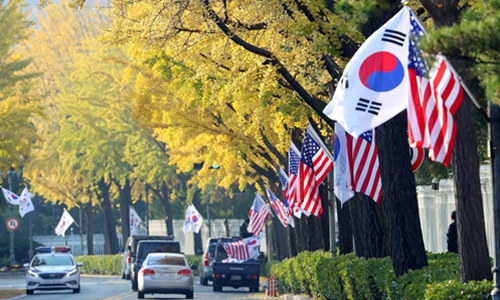
(Photo: VCG)
The increasingly severe novel coronavirus situation in South Korea has not only dealt a heavy blow to the country's ties with the US but has also affected security cooperation between the two.
With the epidemic spreading in South Korea, its ally, the US, did not offer any assistance but instead threw punches.
The US State Department on February 29 raised the travel advisory to South Korea's Daegu to level 4 - Do not travel to - from level 3, and other regions remains at level 3 - Reconsider travel. The US Centers for Disease Control and Prevention also issued a level 3 travel warning, the highest of its kind, for avoiding non-essential travel to South Korea.
US President Donald Trump, who is seeking re-election in November, is eager to show his people the success of his economic policies but is also gravely concerned about a volatile stock market caused by the spread of coronavirus. While South Korea expects the US to lend a helping hand and jointly combat the epidemic, the US only chooses to stick its head in the sand.
Given the increasing number of infected cases in South Korea, the US military has reported its first case among its soldiers based in the Asian country. The US military has also placed its garrisons in South Korea, including its largest army base outside the US, under lockdown.
The activities of the US military are bound to decrease in the wake of the epidemic, and if the number of infected cases in South Korea continues to grow, the US military will just hole up and its combat ability will remain idle.
The South Korean and US militaries have also postponed their annual joint drills out of concerns over the virus outbreak. It is the first time that the two countries have postponed their drills because of an infectious disease.
The two militaries were scheduled to hold a command post training in March, but because of the virus situation in South Korea, the two considered scaling back this military exercise, according to US Secretary of Defense Mark Esper at a joint conference alongside his South Korean counterpart in late February.
During the press conference, Esper even called on South Korea to contribute more to the cost of housing US troops on the Korean Peninsula, a long-held goal of the Trump administration, irrespective of South Korea dealing with the epidemic.
South Korea should realize that the US only cares about its self-interest and has no obligation to South Korea and its people.
By contrast, China, while fighting the epidemic on its own soil, has sent medical materials to South Korea and shouldered its responsibility as a neighbor and as a major power.
Under the circumstances that the denuclearization negotiation between the US and North Korea is deadlocked, the postponement of US-South Korea military exercises also aims at avoiding provoking North Korea. However, Pyongyang seems not to be buying it.
It launched two short-range projectiles off its east coast on March 2 in the country's first weapons test in three months, a move that tests the solidness of the defense posture of the US and South Korea.


